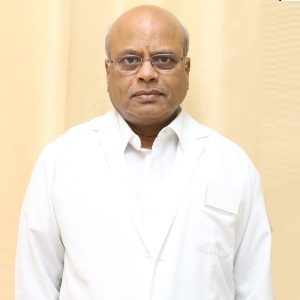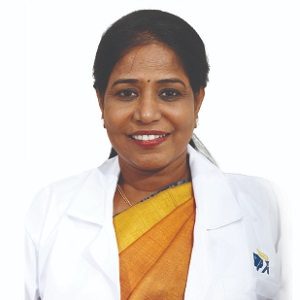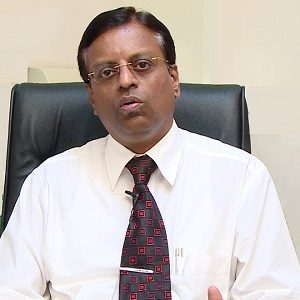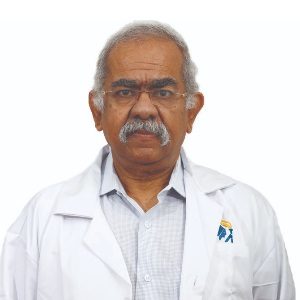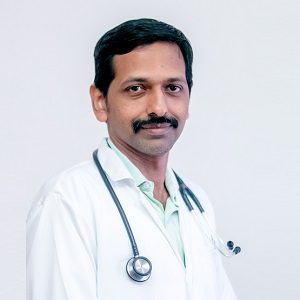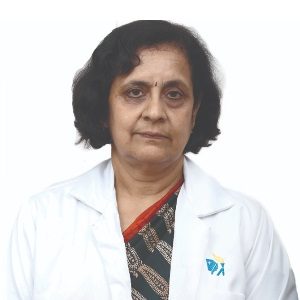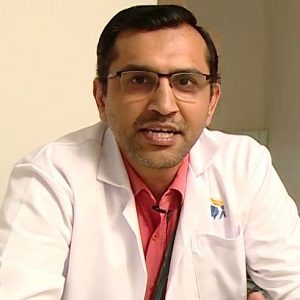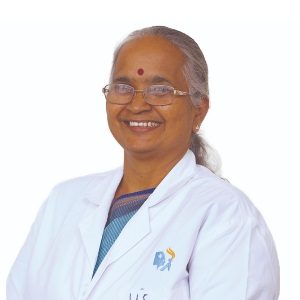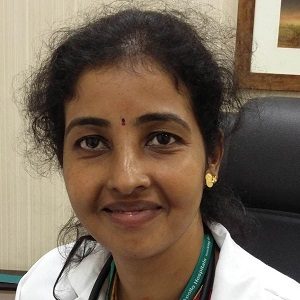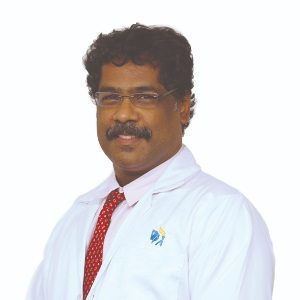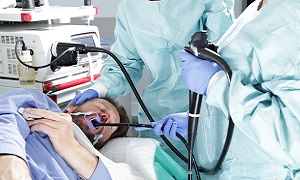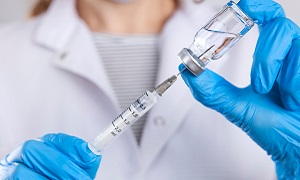Best Doctors in India for Achalasia Treatment
- Surgical Gastroenterologist, Chennai, India
- Over 27 years’ experience
Profile Highlights:
- Dr. Surendran R is an experienced gastroenterologist from Chennai, Tamil Nadu.
- He has been rewarded for his contributions to the field several times. He received The Best Doctor award from the Tamil Nadu government (2002) in his name.
- Being a gastroenterologist, he specializes in treating patients with problems such as Bowel Obstruction, Pancreatic diseases, Esophagus disorders, Fistula treatment, etc.
- Gastroenterologist and GI Medicine Specialist, Chennai, India
- Over 23 years’ experience
Profile Highlights:
- Dr. Revathy Shanmugam is an experienced Gastroenterologist in Tamil Nadu, having an experience of 23 years in the management of GI disorders, Training & Teaching.
- She is highly skilled in the services like Liver Disease Treatment and Inflammatory Bowel Disease (IBD) Treatment.
- She has published various scholarly works in many National & International Publications of Medical Gastroenterology.
- Gastroenterologist and GI Medicine Specialist, Chennai, India
- Over 32 years’ experience
Profile Highlights:
- Dr. Hariharan Muthuswamy is a veteran Gastroenterologist and Hepatologist in India with 22 years of experience (specialist).
- Dr. Muthuswamy treated his patients with Non-Surgical Piles treatment, Liver Disease Treatment, Hepatitis E, Hepatitis A Treatment and Hepatitis B Treatment, Hemorrhoids Treatment, Colonoscopy, Stomach, and Intestinal Treatments, etc.
- He has a special interest in Capsule Endoscopy, Therapeutic Endoscopy, GERD, and Irritable Bowel Syndrome (IBS).
- Gastroenterologist and GI Medicine Specialist, Chennai, India
- Over 32 years’ experience
Profile Highlights:
- Dr. Mohan A T is a veteran GI medicine specialist in India with an experience of 32 years.
- Dr. Mohan, an alumnus of Madras University, is the Co-Ordinator of the Indian Society of Enteral and Parenteral Nutrition.
- He is an expert in treating Gastritis, acidity, Ulcerative Colitis, and many other Intestinal and bowel-related Treatments. In addition to these, he offers Colonoscopy, Gastroscopy, and Endoscopy.
- Gastroenterologist and GI Medicine Specialist, Chennai, India
- Over 15 years’ experience
Profile Highlights:
- Dr. Piramanayagam P is one of the young Gastroenterologists in India, having an experience of 15 years in the field.
- The doctor offer services like Gall Bladder (Biliary) Stone treatment, IBS treatment, Acidity Treatment, Endoscopy, and stomach and intestine dysfunction.
- He published many review articles and books under his name.
- Gastroenterologist and GI Medicine Specialist, Chennai, India
- Over 39 years’ experience
Profile Highlights:
- Dr. Sarojini Parameswaran is one of the renowned Gastroenterologist with an overall experience of 39 years.
- Dr. Parameswaran is brilliant and quick with diagnosis. She has 22 years of specialist experience.
- Gastroenterologist and GI Medicine Specialist, Chennai, India
- Over 24 years’ experience
Profile Highlights:
- Dr. Seshadri Venkatesh P is a well-known Gastroenterologist in India, having 24 years of experience in Stomach and Intestine disorders.
- Dr. Seshadri acquired proficiency in managing Bladder Cancer surgery, hemorrhoids, Irritable Bowel Syndrome (IBS) Treatment, etc.
- He holds membership in Tamil Nadu Medical Council.
- Gastroenterologist and GI Medicine Specialist, Chennai, India
- Over 40 years’ experience
Profile Highlights:
- Dr. Usha Srinivas is a Gastroenterologist in India with an experience of 40+ years in GI in medicine and academics.
- Patients visit her for consultation and treatment of abdominal pain, Gall Bladder (Biliary) Stone, Gastroenteritis, Jaundice, Colonoscopy, Steatosis, Constipation Treatment, Hepatitis C Treatment, Hepatitis E Treatment, Hemorrhoids Treatment, Piles Treatment (Non-Surgical), Gastritis Treatment, Ulcerative Colitis Treatment, and others.
- Gastroenterologist and GI Medicine Specialist, Chennai, India
- Over 18 years’ experience
Profile Highlights:
- Dr. Preethi M is one of the best gastroenterologists in India, with 18 years of expertise.
- Dr. Preethi received many awards for her contribution to the field.
- She offers consultation for Irritable Bowel Syndrome (IBS), Hemorrhoids, Endoscopy, female problems, and other gastrointestinal issues.
- Gastroenterologist and GI Medicine Specialist, Chennai, India
- Over 23 years’ experience
Profile Highlights:
- Dr. Ubal Dhus is a GI specialist doctor in South India who is proficiently managing Gastroenterological disorders for the past 23 years.
- He acquired his medical degree from Madras University, Chennai, and served people with Hemorrhoids Treatment, and Irritable Bowel Syndrome (IBS) Treatment.
Best Hospitals in India for Achalasia Treatment
Venkateshwar Hospital, Dwarka, New Delhi
- City: New Delhi, India
Hospital Highlights:
- State-of-the-art technology and devoted healthcare professionals have been brought together under one roof at Venkateshwar Hospital to provide genuine medical care. The hospital’s professionals work together as a team to deliver the best possible treatment to their patients, using the most sophisticated equipment and information technology.
- Venkateshwar Hospital’s mission is to attain global excellence in healthcare by employing evidence-based, ethical clinical practices and cutting-edge technology by a team of highly skilled experts.
MGM Healthcare, Chennai
- City: Chennai, India
Hospital Highlights:
- Located in Chennai, India, MGM Healthcare is a top multispecialty hospital that provides all medical services under one roof.
- Since its founding in 2019, MGM Healthcare has quickly become a leading national referral centre, creating several innovative flagship initiatives.
- MGM Healthcare combines next-generation medical and digital technologies to provide better patient results.
- With 12 centres of excellence, more than 400 inpatient beds, 100 intensive care unit beds, and 24/7 emergency care, MGM Healthcare leaves no chance in redefining the patient experience in Chennai.
- MGM Healthcare boasts 250+ expert doctors across 30+ departments, including Cardiology, Pulmonology, Neurology, Obstetrics & Gynaecology, and more.
- They house 12 specialized Centres of Excellence, including Neurosciences, Orthopaedics, and Multi-Organ Transplantation.
- Their team of doctors, nurses, and paramedics works together to give every patient individualized treatment.
ACHALASIA
Achalasia is a rare condition of the muscle of the esophagus or swallowing tube. It occurs when the nerves in the esophagus suffer damage. The term achalasia itself means ‘failure to relax’ and it refers to the inability of the lower esophageal sphincter to open and pass food into the stomach. Due to this, people suffering from this condition have difficulty swallowing food.
Unfortunately, there is no permanent cure for achalasia, since once the esophagus is paralyzed, the muscle is unable to work properly again. However, symptoms can be managed by treatments.
Symptoms
The symptoms of achalasia include:
- Difficulty in swallowing food
- Regurgitation of food that is retained in the esophagus. If this happens at night, food may be aspirated into the lungs, which is a serious medical problem
- Loss of weight caused by reduced intake of food
- Chest discomfort caused by esophageal dilation and/or retained food
- Sharp chest pain where usually the cause is unclear
- Heartburn
Causes
What exactly causes achalasia is still not properly understood. However, according to scientists, it may be caused by a loss of nerve cells in the esophagus. There are several theories about what causes this, and it is suspected that autoimmune responses or a viral infection may lead to the condition. Although it is rare, achalasia might be caused by a genetic disorder or infection as well.
Diagnosis
Sometimes, achalasia can be overlooked or misdiagnosed due to its symptoms similar to other digestive disorders, since it has symptoms that are similar to other digestive disorders. The following are likely to be recommended by your doctor:
Esophageal manometry
This test helps to measure the rhythmic muscle contractions in your esophagus when you swallow, as well as the coordination and force exerted by the esophagus muscles. It also measures how well your lower esophageal sphincter relaxes or opens while you are swallowing. This test helps to determine the type of motility problem you might have.
X-rays of your upper digestive system (esophagram)
First, you drink a chalky liquid that coats and fills the inside lining of your digestive tract, after which an X-ray will be taken. This coating helps your doctor see a silhouette of your esophagus, stomach as well as the upper intestine. You might need to swallow a barium pill that can help to show a blockage of the esophagus.
Upper endoscopy
In this method, your doctor will insert a thin, flexible tube equipped with a light and camera (endoscope) down your throat, to examine the inside of your esophagus and stomach. Endoscopy helps to define a partial blockage of the esophagus if your symptoms or results of a barium study indicate that possibility. Endoscopy can also be used in order to collect a sample of tissue to be tested for complications.
Specific treatment depends on your age, health condition, and the severity of the achalasia.
Treatment
The goal of the treatment is to relax or stretch the lower esophageal sphincter so that the food and liquid are able to move easily through your digestive tract.
Nonsurgical treatments
Nonsurgical treatment options include the following:
Pneumatic dilation
In this method, a balloon is inserted by endoscopy into the center of the esophageal sphincter and inflated to enlarge the opening. This outpatient procedure may need to be repeated if the esophageal sphincter doesn’t stay open. Nearly one-third of people treated with balloon dilation need repeat treatment within five years. This procedure requires sedation.
Medication
Botox
Surgical options
Surgical options include the following:
Heller myotomy
In this procedure, the surgeon cuts the muscle at the lower end of the esophageal sphincter as this will allow food to pass more easily into the stomach. This procedure can be performed noninvasively as well. However, it is to be noted that people undergoing this procedure might later develop gastroesophageal reflux disease later or GERD.
To avoid future problems with GERD, your doctor might also perform another procedure at the same time, which is known as fundoplication. This procedure is meant to prevent acid from coming back to the esophagus.
Peroral endoscopic myotomy (POEM)
In this procedure, your surgeon uses an endoscope which is inserted through your mouth and down your throat in order to create an incision in the inside lining of your esophagus. Then, similar to a Heller myotomy, your surgeon will cut the muscle at the lower end of your esophageal sphincter.
This procedure may also be combined with or followed by a fundoplication as this will help in preventing GERD.

